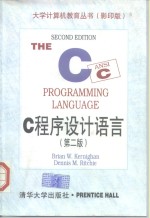

C程序设计语言 第2版PDF电子书下载
- 电子书积分:11 积分如何计算积分?
- 作 者:(美)(B.W.克尼汉)(BrianW.Kernighan),(美)(D.M.里奇)(DennisM.Ritchie)著
- 出 版 社:北京:清华大学出版社
- 出版年份:1998
- ISBN:730202412X
- 页数:272 页
Introduction 1
Chapter 1. A Tutorial Introduction 5
1.1 Getting Started 5
1.2 Variables and Arithmetic Expressions 8
1.3 The For Statement 13
1.4 Symbolic Constants 14
1.5 Character Input and Output 15
1.6 Arrays 22
1.7 Functions 24
1.8 Arguments-Call by Value 27
1.9 Character Arrays 28
1.10 External Variables and Scope 31
Chapter 2. Types, Operators, and Expressions 35
2.1 Variable Names 35
2.2 Data Types and Sizes 36
2.3 Constants 37
2.4 Declarations 40
2.5 Arithmetic Operators 41
2.6 Relational and Logical Operators 41
2.7 Type Conversions 42
2.8 Increment and Decrement Operators 46
2.9 Bitwise Operators 48
2.10 Assignment Operators and Expressions 50
2.11 Conditional Expressions 51
2.12 Precedence and Order of Evaluation 52
Chapter 3 Control Flow 55
3.1 Statements and Blocks 55
3.2 If-Else 55
3.3 Else-If 57
3.4 Switch 58
3.5 Loops-While and For 60
3.6 Loops-Do-while 63
3.7 Break and Continue 64
3.8 Goto and Labels 65
Chapter 4. Functions and Program Structure 67
4.1 Basics of Functions 67
4.2 Functions Returning Non-integers 71
4.3 External Variables 73
4.4 Scope Rules 80
4.5 Header Files 81
4.6 Static Variables 83
4.7 Register Variables 83
4.8 Block Structure 84
4.9 Initialization 85
4.10 Recursion 86
4.11 The C Preprocessor 88
Chapter 5. Pointers and Arrays 93
5.1 Pointers and Addresses 93
5.2 Pointers and Function Arguments 95
5.3 Pointers and Arrays 97
5.4 Address Arithmetic 100
5.5 Character Pointers and Functions 104
5.6 Pointer Arrays: Pointers to Pointers 107
5.7 Multi-dimensional Arrays 110
5.8 Initialization of Pointer Arrays 113
5.9 Pointers vs. Multi-dimensional Arrays 113
5.10 Command-line Arguments 114
5.11 Pointers to Functions 118
5.12 Complicated Declarations 122
Chapter 6. Structures 127
6.1 Basics of Structures 127
6.2 Structures and Functions 129
6.3 Arrays of Structures 132
6.4 Pointers to Structures 136
6.5 Self-referential Structures 139
6.6 Table Lookup 143
6.7 Typedef 146
6.8 Unions 147
6.9 Bit-fields 149
Chapter 7. Input and Output 151
7.1 Standard Input and Output 151
7.2 Formatted Output-Printf 153
7.3 Variable-length Argument Lists 155
7.4 Formatted Input-Scanf 157
7.5 File Access 160
7.6 Error Handling-Stderr and Exit 163
7.7 Line Input and Output 164
7.8 Miscellaneous Functions 166
Chapter 8. The UNIX System Interface 169
8.1 File Descriptors 169
8.2 Low Level I/O-Read and Write 170
8.3 Open, Creat, Close, Unlink 172
8.4 Random Access-Lseek 174
8.5 Example-An Implementation of Fopen and Getc 175
8.6 Example-Listing Directories 179
8.7 Example-A Storage Allocator 185
Appendix A. Reference Manual 191
A1 Introduction 191
A2 Lexical Conventions 191
A3 Syntax Notation 194
A4 Meaning of Identifiers 195
A5 Objects and Lvalues 197
A6 Conversions 197
A7 Expressions 200
A8 Declarations 210
A9 Statements 222
A10 External Declarations 225
A11 Scope and Linkage 227
A12 Preprocessing 228
A13 Grammar 234
Appendix B. Standard Library 241
B.1 Input and Output: <stdio.h> 241
B.2 Character Class Tests: <ctype.h> 248
B.3 String Functions: <string.h> 249
B.4 Mathematical Functions: <math.h> 250
B.5 Utility Functions: <stdlib.h> 251
B.6 Diagnostics: <assert.h> 253
B.7 Variable Argument Lists: <stdarg.h> 254
B.8 Non-local Jumps: <setjmp.h> 254
B.9 Signals: <signal.h> 255
B.10 Date and Time Functions: <time.h> 255
B.11 Implementation-defined Limits: <limits.h>and <float.h> 257
Appendix C. Summary of Changes 259
Index 263
- 《指向核心素养 北京十一学校名师教学设计 英语 七年级 上 配人教版》周志英总主编 2019
- 《设计十六日 国内外美术院校报考攻略》沈海泯著 2018
- 《计算机辅助平面设计》吴轶博主编 2019
- 《高校转型发展系列教材 素描基础与设计》施猛责任编辑;(中国)魏伏一,徐红 2019
- 《景观艺术设计》林春水,马俊 2019
- 《程序逻辑及C语言编程》卢卫中,杨丽芳主编 2019
- 《高等教育双机械基础课程系列教材 高等学校教材 机械设计课程设计手册 第5版》吴宗泽,罗圣国,高志,李威 2018
- 《指向核心素养 北京十一学校名师教学设计 英语 九年级 上 配人教版》周志英总主编 2019
- 《幼儿园课程资源丛书 幼儿园语言教育资源》周兢编 2015
- 《Cinema 4D电商美工与视觉设计案例教程》樊斌 2019
- 《SQL与关系数据库理论》(美)戴特(C.J.Date) 2019
- 《魔法销售台词》(美)埃尔默·惠勒著 2019
- 《看漫画学钢琴 技巧 3》高宁译;(日)川崎美雪 2019
- 《优势谈判 15周年经典版》(美)罗杰·道森 2018
- 《社会学与人类生活 社会问题解析 第11版》(美)James M. Henslin(詹姆斯·M. 汉斯林) 2019
- 《海明威书信集:1917-1961 下》(美)海明威(Ernest Hemingway)著;潘小松译 2019
- 《迁徙 默温自选诗集 上》(美)W.S.默温著;伽禾译 2020
- 《上帝的孤独者 下 托马斯·沃尔夫短篇小说集》(美)托马斯·沃尔夫著;刘积源译 2017
- 《巴黎永远没个完》(美)海明威著 2017
- 《剑桥国际英语写作教程 段落写作》(美)吉尔·辛格尔顿(Jill Shingleton)编著 2019
- 《大学计算机实验指导及习题解答》曹成志,宋长龙 2019
- 《指向核心素养 北京十一学校名师教学设计 英语 七年级 上 配人教版》周志英总主编 2019
- 《大学生心理健康与人生发展》王琳责任编辑;(中国)肖宇 2019
- 《大学英语四级考试全真试题 标准模拟 四级》汪开虎主编 2012
- 《大学英语教学的跨文化交际视角研究与创新发展》许丽云,刘枫,尚利明著 2020
- 《北京生态环境保护》《北京环境保护丛书》编委会编著 2018
- 《复旦大学新闻学院教授学术丛书 新闻实务随想录》刘海贵 2019
- 《大学英语综合教程 1》王佃春,骆敏主编 2015
- 《大学物理简明教程 下 第2版》施卫主编 2020
- 《指向核心素养 北京十一学校名师教学设计 英语 九年级 上 配人教版》周志英总主编 2019
